| |
Crippled Pilgrims
- Down Here: Collected Recordings (1983-1985)
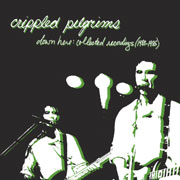 Artist:
Crippled Pilgrims
Title: Down Here: Collected
Recordings (1983-1985)
Catalog#: REACT-CD-004
Price: $10.00 |
Tracks
on this CD: |
| 1. Black
and White |
|
10. Sad but
True |
| 2. Under
The Ladder |
|
11. Calculating |
| 3. People
Going Nowhere |
|
12. Undone |
| 4. Out Of
Hand |
|
13. What
You Lost |
| 5. Dissolving |
|
14. Pretend
Not To Care |
| 6.
A Side He'll Never Show |
|
15. The Sense |
| 7.
Down Here |
|
16.
Not Good |
| 8. So Clean |
|
17.
People Going Nowhere (alternate version) |
| 9. Oblivious
and Numb |
|
18. Black
and White (alternate version) |
| |
When we
started Reaction Recordings we wanted to release music
we loved but thought had passed by too many people unnoticed.
The first Reaction release was an album entitled Rolled
Gold by the amazing sixties English pop group, The
Action. We followed that with a re-release of the 1956
recording, Songs of the Pogo, by Walt Kelly and
Norman Monath. Next up came A Thousand Day Dream
by Urbana-Champaign's favorite garage-pop band, The
Vertebrats. Now, Reaction Recordings is proud to present
the complete vinyl output of Crippled Pilgrims.
Crippled Pilgrims is the perfect example of a band who
seemingly went unnoticed during their lifespan, but now
sound as contemporary as anything being released today.
How and why a band this good somehow managed to sneak
under the critical and popular radar during their heyday
is difficult to understand. We're not sure it makes any
difference, as long the magic they committed to tape is
finally available again for music lovers to enjoy now
and for years to come.
Although the original master tapes have been lost, we've
managed to track down virgin vinyl copies of both their
EP and album, and each has been meticulously re-mastered
and presented here along with two rare bonus tracks.
If, like us, you love this music as much as anything you've
ever heard, please help spread the word. We believe Crippled
Pilgrims have gone missing long enough!
Peace and love,
Geoff & Ric
Reaction Recordings
This is the sort of album that you listen to a few times
without really noticing what's going on. Then, without
warning, things start to happen: you hum along unconsciously,
you add your own mental notes when a particularly classic
chord progression comes along, you recall certain lyrics
later in the day... last year's 6-song mini-album, "Head
Down-Hand Out", got the kind of critical raves that are
generally reserved for veterans of the music biz, and
the new release is certain to follow in it's predecessor's
footsteps. Imagine some sort of psychedelic garage combo
playing jazz on the side for extra bucks; picture a surreal
blending of Televison, Grateful Dead, space cowboy Byrds
and Meat Puppets.
C.P. are from D.C. and are led by singer/songwriter/cover
artist Jay Moglia; Mitch Parker plays bass, Dan Joseph
contributes drums and some great piano playing as well,
and Scott Wingo handles lead guitar. Of the latter I cannot
begin to curb my praise, for the astonishing clarity with
which Wingo unleashes his notes is chilling at times,
so fluid and on-the-mark are his offerings. While Moglia’s
vocals are never "pretty" or even completely in tune,
they seem perfectly suited for his hazy, ambiguous lyrics,
recalling at times Lou Reed or perhaps a younger Robyn
Hitchcock.
Some of the tunes will sink in before others thanks to
the insidious hooks, but I should point out a few of my
faves: "Not Good", the heavy rocker, guitar modalities
reverberating around a relentless beat; "Undone", which
starts off like a midtempo Lou Reed street vignette then
romps off in a series of mini rave-ups on guitar; "So
Clean", full of clever cops froma lot of songs, riffs
plundered with wicked glee; "Oblivious And Numb", a pretty
ballad with not-so-pretty lyrics and a healthy dose of
that fluid guitar I mentioned. Eventually all of the tunes
will sink in - I think some will call this album a "sleeper"
- and you WILL be hooked. A fine brilliant album. Look
for the bright green cover and electric blue vinyl.
- Fred
Mills, Bucketfull Of Brains (1985)
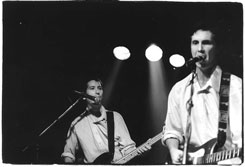 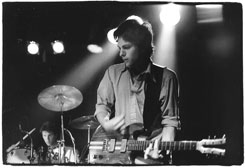
The Crippled Pilgrims Story
After being kidnapped by the savage noise troubadours
Death Camp 2000 (featuring the rhythmic styling of Jay
Spiegel a.k.a. the Rummager and the not yet famous thrashings
of sound impresario Don Fleming), Jay Moglia's path shifted
from its idyllic moorings onto an uncertain carousel of
melody and mayhem. The 21-year-old Moglia took a crash
course in guitar to color his vivid wordscapes and began
looking for bandmates. Meanwhile, Scott Wingo sat at home
drinking and wallowing in self-pitying gloom. His housemate
Charles Steck had recently enlisted as bassist for Fleming's
phenomenal pop combo the Velvet Monkeys - a fact that
made Wingo's inability to fulfill his adolescent fantasies
of rock stardom all the more agonizing.
As Moglia's embryonic attempts at song emerged, he was
lucky to have the Velvet Monkeys help in fleshing them
out with background noise. He lived in the room directly
adjacent to the Monkeys' rehearsal space and spent many
days lurking in the corner hoping for an invitation to
jam. In time, whether for the good of rock or just to
get him out of their ascending orbit, the Monkeys suggested
that Moglia get together with Wingo for a musical chemistry
check.
Scott arrived at Jay's house fully expecting to meet a
circa 1982 standard-issue punk/alternative type but was
instead greeted by a clean-cut young man in a green golf
sweater with a stutter on his tongue and a phantom in
his eye. This was Jay Moglia.
It wasn't long before the two started blending ideas.
Wingo had cut his teeth in the influential DC punk band
Trenchmouth, but his musical leanings were as much Beatles
as Ramones, and Moglia's meandering yet forceful compositions
allowed plenty of space for the outcast guitarist to sharpen
his knives. Prominent among these knives was a recently
acquired affinity for modal psychedelic noodling. Despite
a valiant Punk/British Invasion-hardened resistance to
all things Dead, a recent chance encounter with a particular
ergot-derived substance combined with a well-timed Aoxomoxoa
turntable spin had opened Wingo's ears and fingers to
a whole new palette of six-string possibilities. The wide-open
nature of Jay's pieces seemed to provide an apt canvas
for somehow combining the alcoholic glee of pure hard
rock with the lysergically-damaged wanderings of the not-so-distant
past. (Whether this was actually achieved is an entirely
separate question.)
The duo's joy in their well-meshed "sound" overshadowed
more earthly concerns like song structure and length.
An early Pilgrims show could easily last an hour as they
whipped through their six-song set. It took bassist Mitch
Parker, previously with the legendary DC punk outfit Government
Issue, to bring some focus and direction to the raw strands
of tune. Parker's ability to slice through musical excess
coupled with his local scenester par excellence credentials
quickly landed the group a slot on Fountain of Youth's
compilation LP Bouncing Babies, immediately leading
to the recording of their EP Head Down Hand Out
(also on Fountain of Youth).
Through all of this, one central question remained unanswered:
Who was the Crippled Pilgrims' drummer? The Velvet Monkey's
Rummager (who shortly afterward reached heartthrob status
as drummer for DC boy band HE) handled some of the crucial
early gigs and sessions (including the first Inner Ear
demo which yielded the Bouncing Babies track).
At other times it was hard-hitting Tommy Carr of the powerful
quartet Black Market Baby stepping in at the last minute
to rescue the Pilgrims on show night. Ultimately, Dan
Joseph, who had been with the group only two weeks before
recording Head Down Hand Out, would become the drummer
of record. Joseph never became an "official" member of
the band due to his commitment with the progressive horror
rock ensemble 9353. Though generous with his time, Joseph
was reluctant to be affiliated with the Pilgrims. Jay,
Scott, and Mitch's "regular guy" personas were no match
for the preening charisma 9353 brought to the stage. Plus,
Crippled Pilgrims' reputation for flowing melody and the
occasional extended guitar solo had burdened them with
a comparatively uncool reputation amid the rigid conformity
of the then thriving harDCore scene. At 17 years old,
Dan Joseph could certainly be excused for downplaying
such a potentially credibility-busting association.
The revolving-door drummer status meant gigs for the Pilgrims
were infrequent. Shortly after the release of Head
Down Hand Out, Moglia, stifled by inactivity and
bolstered by the EP's positive reviews and healthy college
chart rankings, set out for NYC hoping to expand the group's
profile and ultimately relocate the band. Unfortunately,
he neglected to tell Wingo and Parker about his ambitious
plans and was surprised when they didn't join him in Manhattan.
Instead of extending the ranks of New York's rock elite,
Jay found himself dazedly wandering the city's avenues
carrying a can of blue spray paint and a cardboard "Crippled
Pilgrims" stencil. Scott and Mitch were left back in DC
with the proverbial question marks hanging over their
heads.
Moglia eventually recovered from his spray-painted daze
and began laying down tracks for an atmospheric collection
of electronic folk songs under the name Geezer Park. The
music was actually pressed and was poised to become the
first release on Bar/None Records when Jay inexplicably
pulled the plug on the project. In the meantime, Head
Down Hand Out gathered momentum, garnering notable
amounts of airplay in obscure and far-away markets. This
came as a surprise to the group as their local DC following
was less than massive. In mid-1984, with a fair number
of Pilgrims' tunes never given a proper recording and
Fountain of Youth pressing for a follow-up to Head
Down Hand Out, Jay, Scott, and Mitch tentatively
decided to revive the group.
With Jay commuting from NY to DC for gigs and recording
sessions, Mitch and Scott both unwilling to abandon their
relatively comfortable DC existences, and the continuing
"who is our drummer" plague, the future did not bode well
for the band. However, the trio (along with the drummer
of the moment) managed to squeeze out a few more shows--the
final being a pairing with LA's Gun Club at DC's 9:30
Club on September 7, 1984.
Recording and mixing of tracks continued sporadically
throughout the fall of 1984. When Under Water was
released the following spring, it was met with strong
reviews and college radio airplay, but Crippled Pilgrims
as a performing and recording unit were history.
In the ensuing years, Jay, Scott, and Mitch continued
to make music together in various combinations and permutations.
Notable among these was the full-frontal, testosterone-drenched
stance of CPU (Crippled Pilgrims Unlimited), who, disappointingly,
never performed beyond a few private parties. More fortunate
in outreach was the crystalline rock perfection of Rambling
Shadows whose initial mid-90's stirrings saw Jay and Mitch
mining the urban underbelly for inspirational fuel. For
reasons that remain murky, Mitch, in early 1996, abruptly
quit the project, never to be seen or heard from again.
The aforementioned Charles Steck (Velvet Monkeys, High-Back
Chairs, Lida Husik) and Scott Wingo stepped in to salvage
and retool, adding their own unique marks to the sound.
This time around, the drummer was official - the multitalented
Davis White (Foundation, Lorelei, Alice Despard Group
among many others). Though the quartet never attained
the popularity of Crippled Pilgrims, it gigged regularly
in the DC area and even managed to have a couple of tunes
released on obscure compilation CDs (Welcome to the
Big Ring and Bumper to Bumper Hits, Vol. 2),
with many other excellent tracks still awaiting release.
After a five year hiatus, in early 2004, the Rambling
Shadows re-emerged from the depths fully primed for yet
another round of amplified truth promulgation - walking
hard and thinking wrong.
The music encoded on this CD is the towering pinnacle
of 1980's alt-rock. That few realized it at the time of
its original release matters not a whit. What matters
is that you now listen and know the glorious truths awaiting
within.
Clint Vista
Terrain Press
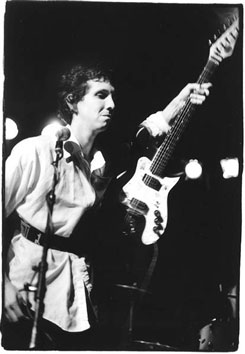 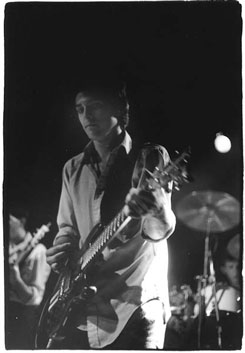
I was a dry sponge
Ever since I was an eleven-year-old kid in Rockford, Illinois,
riding my Schwinn Sting-Ray to the local record store
to buy my first album (Cheap Trick's At Budokon),
finding great music has always been about the thrill of
the hunt.
I thought I'd done a great job of schooling myself in
the years that followed, but as I descended upon Champaign-Urbana
from suburban Chicago to attend college in the mid-80s,
my eyes were opened wide. I'd been under the incorrect
assumption that I was perched atop the cutting edge with
my diet of MTV and an extensive library of U2, Echo &
The Bunnymen, The Smiths, and R.E.M. singles only to discover
that I didn't even speak the language of underground music.
I was a blank page, a dry sponge.
A girl without freckles is like a night without stars
and suddenly I'm there too. Alone. Left wondering what
my ears had been doing over the past 18 years.
With this humbling realization, I set out to learn all
that I could about the thriving underground rock landscape.
I even stopped buying U2 records (The Joshua Tree
had just been released and the band didn't seem to need
my help anymore anyway) and stopped going to concerts
that could accommodate more than 200 fans, missing a great
R.E.M. show on campus that year.
The number of new bands that I unearthed each week seemed
endless. I developed an addictive desire for finding out
about bands like The Replacements, The Flaming Lips, Squirrel
Bait, Dumptruck, Big Black, Thin White Rope, The Rain
Parade, Cocteau Twins, The Gun Club, Green On Red, Hüsker
Dü, Mission Of Burma, Severed Heads, Sonic Youth, Camper
Van Beethoven, Savage Republic, The Dream Syndicate, Bauhaus,
Minor Threat, Minutemen, Dinosaur Jr., Naked Raygun, Hollowmen,
Alice Donut, Descendents, Skinny Puppy, The Judy's, The
dB's, American Music Club, Bad Brains, The Silos, Spacemen
3, The Lemonheads, Flipper, and Meat Puppets. Money my
parents had intended for an occasional meal outside of
the dormitory cafeteria was quickly converted into vinyl
at the local record store, Record Swap, along with a box
of cassettes from Discount Den, and a visit to That's
Rentertainment, a shop that lended out a vast library
of albums before being threatened by the RIAA, then splintering
into a video store and, later, birthing Parasol Records.
The thing that continues to impress me most about the
grassroots music scene burgeoning in the US from the mid-to-late
80s is how varied the artists in the scene were. Breaking
Circus and The Crazy 8's, Let's Active and The Butthole
Surfers had little to do with each other from a stylistic
standpoint. It seems the sole factor unifying these bands
was that the originality of their material rose above
that of the standard fare.
In these times the cream of each local scene seemed to
rise to the top. While many bands could throw together
a local cassette tape to sell on consignment at gigs and
shops, it was only the very best bands that released actual
albums that made it to store shelves outside of their
insular communities. At this point in time, if a band
released an album with national distribution that a guy
like me could find in a big city or college town, there
was almost a guarantee that the music contained in that
sleeve was going to be of high quality. Maybe not better
than the last record that you'd purchased, but better
than the material by the other bands from that town and
a worthwhile document of that particular scene.
These were the days before manufacturing technology and
the Sub Pop explosion made it feasible and fashionable
for any run-of-the-mill band to cut a 45, before the days
of affordable home studio gear and CD-burners. The mere
existence of vinyl for a band at that time gave them credibility,
unlike the current glut of CDs on the market that make
you work harder to determine which artists are worthy
of your attention.
Of all the exciting recordings from this time period,
among my most beloved are those released by Washington
D.C.'s Crippled Pilgrims.
I first heard Under Water when a friend brought
it back to our dorm from Record Swap. He'd rolled the
dice on this band based upon a comparison toward Television
and The Velvet Underground, and, after all, six dollars
was a small risk to take on the promised greatness testified
to by the store's influential record buyer Charlie "The
Quaker" Edwards. Greeted by a tangle of guitars and an
"in the room" immediacy lent to the singer's cathartic
vocals, we quickly knew that we'd both hit paydirt with
his purchase. I ran to my room to get a blank cassette,
so I could start taping the day's new treasure.
As time passed and there were new bands to uncover, many
records became yesterday's news, simple stops along the
journey, but month-in and month-out, I returned to the
comforts of my Crippled Pilgrims cassette. Over the years,
I developed an urgent need to own the actual, hard-to-find
LP and scoured record bins religiously whenever I was
out of town. I made an outstanding offer to my friend
to buy his copy for $50, hoping that someday he'd be strapped
for cash and the band's clear-blue vinyl would soon find
its way into my collection. Alas, he's no dummy and has
held onto the album to this day.
In the late 90s, I finally found my copy in a used record
bin in Chicago. It may be the best $1.99 I've ever spent
and the most satisfied sigh I've ever exhaled.
In the mid-90s I started working for Parasol Records and
invariably brought the Crippled Pilgrims to listen to
during the workday. I was pleasantly surprised when owner,
Geoff Merritt, chirped up one day, "You like the Crippled
Pilgrims?"
" I love them," I replied. " I thought there were only
two of us in the world who owned this record."
" Nope, make that three. They were fantastic."
Either Geoff or I would show up at work with a Crippled
Pilgrims record every few months. With our grins stretching
from ear-to-ear, we would bob our heads around the office,
acting like the only people in the world who knew the
answers to life's great questions. When Geoff first bought
a CD-burner, Crippled Pilgrims were at the top of his
burn pile.
Meanwhile, I'd search the World Wide Web every few months,
looking for information that I knew didn't exist about
the band I cherished… until the day I found a band listing
and mp3s along with an email address. I sent an email
of encouragement and thanks for the music, expecting no
reply.
The next day, I heard from guitarist Scott Wingo thanking
me and letting me know that none of the Crippled Pilgrims
material had ever made it to CD, and if I had a CD-R copy
might I forward one along to him. It didn't take long
before a plan for spreading the word about these spectacular
recordings through our home base at Parasol and our reissue
label, Reaction Recordings, took shape.
Crippled Pilgrims are a band whose influence should have
been far reaching, but who have (until now) gone largely
unnoticed. To my ears, these songs sound timeless. On
one hand, they are a product of a bygone time and on the
other they are as current sounding as anything else from
today's American rock underground. The band is simply
spellbinding, and while their brand of neo-psychedelia
conjures influences of the era (like Dumptruck, Television,
Meat Puppets, Wire, The Beatles, Ramones, Grateful Dead,
The Rain Parade, Green On Red, The Dream Syndicate, etc.),
it also sounds very much like music that could have been
written and recorded yesterday. It's as current sounding
as it is an echo of the past and I think that's one of
the band's greatest strengths and one of the main reasons
I've returned to them year in and year out.
It's like playing a copy of Slint's Spiderland.
Your jaw hits the floor not because it sounds like a terrific
record from 1991, but because it sounds like a great record.
Period.
I hope that you will enjoy these recordings half as much
as I have - now favorites of mine spanning the past 20
years - and, equally, I hope you enjoyed whatever path
you took to get here, be it crooked or straight. As any
record collector can attest, just when you think the journey
is over, something new pops up to take its place. Getting
there is half the fun.
Happy hunting,
Bill Johnson
Parasol
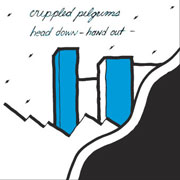 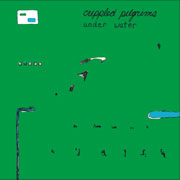
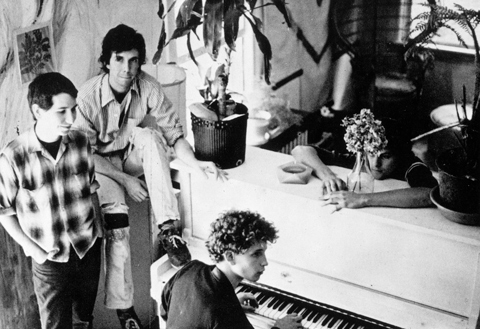
|
|
|
|
|